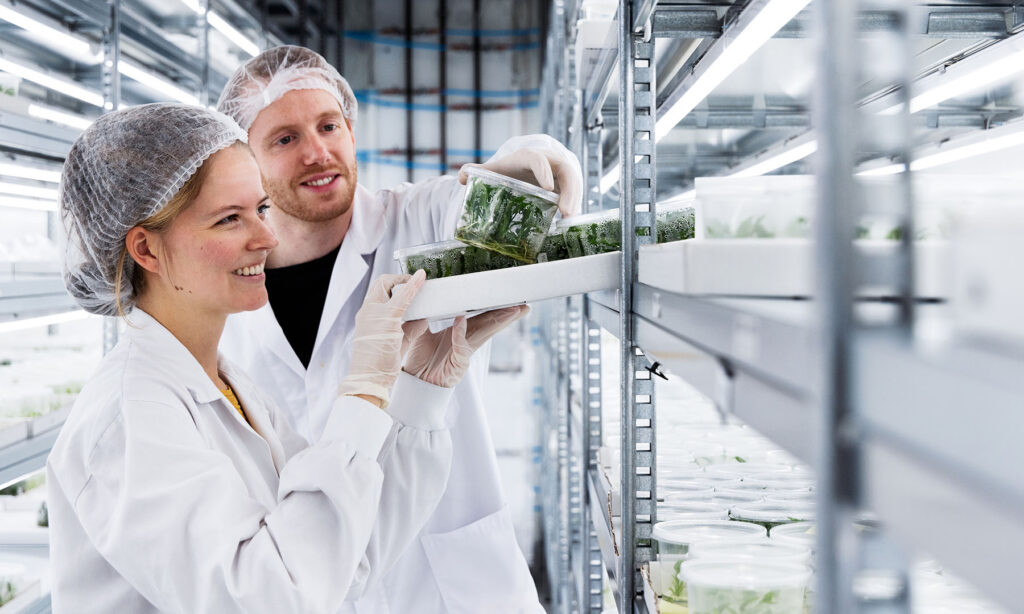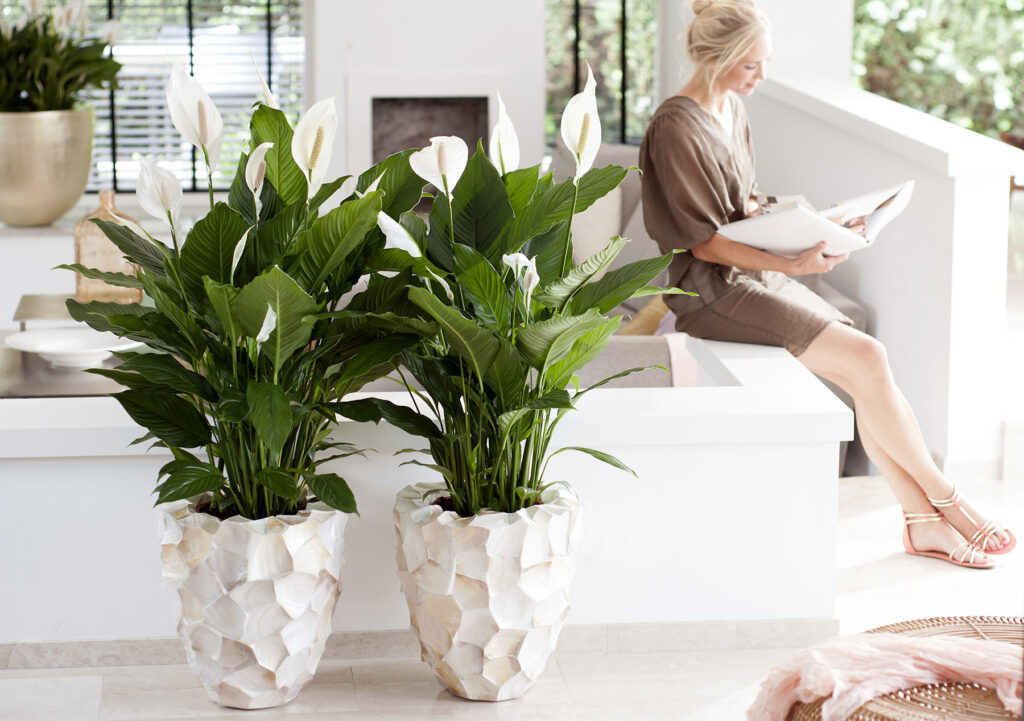Seventy-five. That’s how many candles will be on KP Holland’s birthday cake next year. Secret of their success? The unique combination of both production and propagation as well as breeding of Kalanchoe, Spathiphyllum and Curcuma. Not to mention their pioneering role when it comes to sustainability. Commercial director Pim van der Knaap gives us a look behind the scenes.
Specialising in excellence
Back to the beginning for a moment. In 1950, Jan van der Knaap cautiously started growing vegetables. He soon switched to pot plants. From 1970, the second generation came to the fore. Each son specialised in a particular crop. One in Kalanchoe, another in Spathiphyllum and the third in Curcuma. This fixation on a particular product would later bear fruit.
Today, the third generation is at the helm. The crops have remained, but the business structure looks slightly different. Pim explains. “For example, I am responsible for everything to do with commercial,my brother for all production and my nephew for engineering and ICT. A logical evolution. Because we have built up in-depth knowledge about each crop, we have attracted a significant market share to ourselves in recent years. Moreover, twenty-five years ago we started breeding new varieties within each product group. This has given us a solid position, a solid basis to grow further and who knows, maybe add a new product group.”

Controlling the market with a distinctive product range
KP Holland started breeding because they themselves were not so satisfied with the genetic material provided. Gradually, they did the same for others. So aren’t they shooting themselves in the foot? “On the contrary,” Pim explains. “We are responsible for the products we put on the market. If a product doesn’t do well, it returns like a boomerang. Moreover, this is how we keep the market under control. Another advantage: we can test the new variety in two environments. Both with us, and with other growers. A privileged situation if you want to bring new varieties onto the market.
This gives us a strong range that is less susceptible to diseases and pests, has a longer shelf life, stronger flowers. Each crop distinguishes itself in its own way. In Spathiphyllums breeding, for instance, we emphasise pollen-free genetics. Result? You get a cleaner product that leaves no white powder behind. Less pollen also means fewer allergic reactions. What else? The plants attract fewer thrips, which means growers of these varieties need far fewer pesticides.
With Kalanchoe, we focus on a nice full flower head, with lots of buds and firm leaves. The long flowering time, around eight weeks, is also an important criterion.
And then there is our Curcuma. In this, we are the only breeder worldwide. How that came our way? My grandfather was a man of the world. When he landed in Thailand, he instantly fell in love with Curcuma. After testing and slowly building it up, he developed a market for it. Today, as many as two million Curcumas are produced in Europe.
Accelerating each other
KP Holland stands for ‘Plant Excellence’. A promise they deliver not only with their high-quality product range, but also with the way they work together. “We don’t just sell a product, we sell trust. We want to be a true partner, think along and look for solutions together. I think that’s where the key lies for the future. That is why we are also affiliated with The Accelerators, a collective of floriculture companies taking the lead in making the chain more sustainable. We try to literally accelerate each other, and by extension the whole sector, on issues such as footprinting, biodiversity, energy and so on. Because ultimately, we have to do it together. By talking to each other and sharing best practices, you encourage each other to take the next step.”
“Because in the end, we have to do it together. By talking to each other and sharing best practices, you encourage each other to take the next step.”
Pim van der Knaap, Commercial Director KP Holland
100% green cultivation
Sustainability has long been high on the agenda at KP Holland. For instance, they recycle almost everything, generate their own energy and are connected to the geothermal heat network. In breeding, disease resistance is a crucial trait that reduces the need for plant protection products. That is the basis, but they are doing much more. “We are doing tests to grow peat-free. But that still has some ground to cover. We have also started a project together with some Kalanchoe growers. Our goal? 100% green cultivation. Putting all the knowledge, data and insights together to eventually arrive at a crop grown without resources.”
Forging bonds on the football pitch
Empowering each other. Communicating transparently about data. It typifies not only KP Holland but also Floréac. It explains why the cooperation goes back so long. “Geert Floré often visited us here. And vice versa, we would occasionally travel to Belgium. My father Aad recently recalled a fine anecdote. We used to play football with our team against the team from Floréac. With the inevitable BBQ and Belgian beer afterwards. (laughs) Today, too, the cooperation is firmly based on mutual trust. Our account manager Ruud and the purchasing manager Lisette at Floréac regularly put their heads together to share information. The result is a rock-solid action plan. In addition, we share a progressive digital vision.”

People first
No KP Holland without the 150 full-time equivalents working there today. Some have even been there for a career. That says a lot about a company. “Our people are number one. We want to be a place where employees can develop. Of course, we live in an economic reality and we have to look at profitability and efficiency. To repetitive tasks that can be automated, for example. If that is the case, then we engage with our people. What do they themselves want? What talents do they want to use? We actually do everything we can to keep our people with us.
It is not only at our Dutch locations that we put our efforts into this. We also share ownership of a cutting company in Uganda. We have been producing high-quality Rosalina Kalanchoe cuttings there for more than 15 years. From every cutting sold, part of the amount goes to a charity investment fund. Before our arrival, there was nothing in that place. Today, 500 families have an income and there is a village with important facilities such as a small school and a doctor. Workers can have free breakfast and lunch and there is childcare.”
Championing sustainability together
Finally, a look to the future. “I notice that young people, especially since corona, are doing a lot with plants and flowers. So that’s fine. For the sector itself, it is important that everyone pulls the sustainable cart. I understand it’s a barrier for some growers, but you just have to take that step. Start with one thing, footprinting for example. And work together. Only by joining forces will you grow.”
